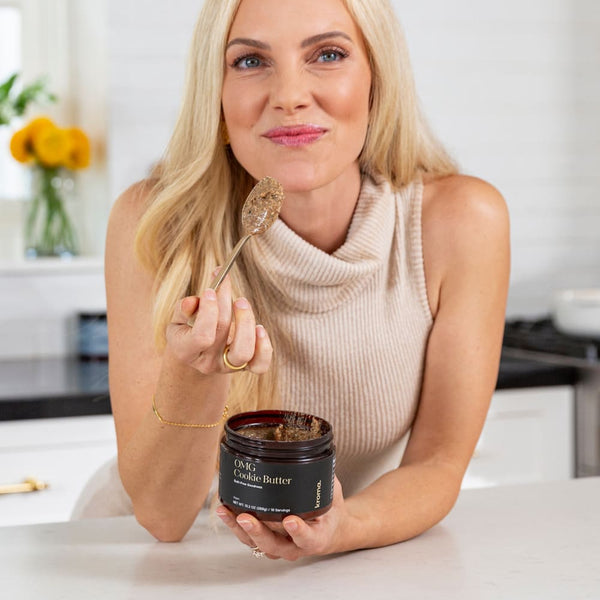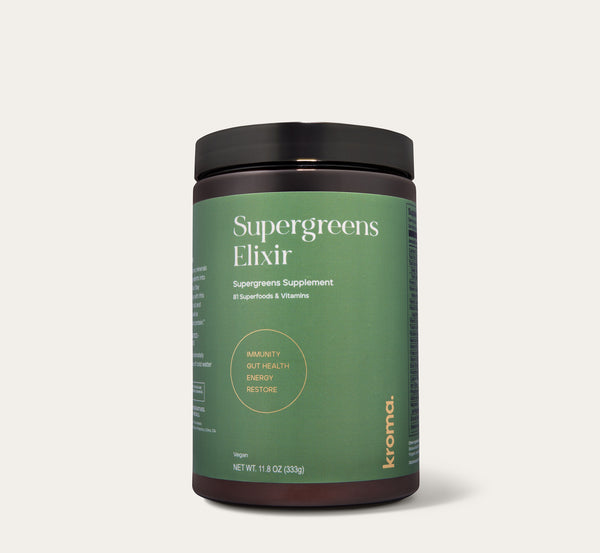With so many diets being touted these days, it can be confusing to know what is best for you.
How do you know where to start and what is best for your specific needs? That’s just it, there is no one way. Nutrition is extremely personal, and functional nutrition has that uniqueness at its core.
With a holistic approach to health and the belief that food is medicine, there are many things that align functional nutrition with our philosophy here at Kroma Wellness.
Let’s take a closer look at what exactly functional nutrition is, how you can implement functional nutrition in your everyday life, and what foods you can eat while following a functional nutrition diet.
What Is Functional Nutrition?
Functional nutrition is all about you and your unique health goals. We are all different with different nutritional needs.
Functional nutrition is a whole-body approach that looks at your environment, your exertion level, mental health, and previous and current medical history. There are a few key diet principles in functional nutrition, like maintaining a whole-food diet and limiting or eliminating refined carbohydrates and processed foods. Functional nutrition also focuses on gut health and individualized nutrient deficiencies.
With its dedication to full-body health, functional nutrition is more of a lifestyle. Not only does it focus on what you put into your body, but also your stress levels, sleeping habits, and overall mental health.
There is more and more research coming out about the effects of mental health on your overall health. While functional nutrition believes that food is medicine, our body is one entity.
If one thing is not working at its optimal level, like your sleeping habits, for example, that can cause a negative trickle effect through your whole body.
How Is Functional Nutrition Different From Standard Nutrition?
If functional nutrition is personal, standard nutrition is one-size-fits-all. Standard nutrition is just that — standard. It is put in place to manage the diets and health of an entire population, and not the specific needs of individuals.
While many of the standard health guidelines are generally helpful, such as the recommendations to eat more whole foods and limit sugars, they do not account for the individual needs of one person.
Standard nutrition doesn't take the whole body into consideration but only looks at the food consumed, unlike functional nutrition.
What Are the Benefits of Functional Nutrition?
You might be wondering how to start a functional nutrition journey. Looking for a functional nutritionist or functional doctor would be a great first step. They’ll ask you questions about your overall goals, current medical conditions, how you handle stress, what your sleep patterns are like, and your overall diet. They also have lab tests they can run to detect any nutrient deficiencies you may have.
With a functional nutritionist setting up your wellness plan, you will have the benefit of a tailored, nourishing wellness plan that is easy to implement.
Tailored to Your Bio-Individuality
Bio-individuality means every person has different nutrition needs based on their blood type, metabolism, body shape, genetics, physical activity, and personal tastes. This bio-individuality is the main focus of functional nutrition.
By looking at you and your lifestyle as one, and not focusing on individual bodily systems (like cardiovascular, reproductive, or mental health) as separate entities, you will get a more holistic nutritional plan.
Your functional nutritionist can run certain tests like blood work, GI-MAP for gut health, DUTCH test for hormones, organic acids test (OAT) for overall health, and a food sensitivity panel. By looking at your specific labs, your functional nutritionist can use these findings to make a plan for you to succeed in your health goals.
Easier To Implement

With your very own tailored health plan in hand, you know what to follow. You don't need to get distracted by every new Instagram or TikTok post out there that tells you about the newest fad diet. You will have a plan made specifically for you.
Your functional nutritionist can come up with easy ways to get the nutrients you need on a daily basis, as well as advise you on how much physical activity and sleep you should be getting.
Our 5-Day Reset program is a lifestyle program that works to deliver immediate results and long-term success, all based on the concept of incorporating functional nutrition into everyday life. Once your 5-Day Reset is complete, you can pick your favorite Kroma lattes, smoothies, and broths to incorporate into your daily life.
Makes Sure You’re Nourishing Your Body
The best part of functional nutrition is it takes the guesswork out of nutrition. How many times have you researched different diet plans only to be left completely overwhelmed and confused?
It is hard to know what is right for you. Knowing exactly what you are deficient in and how to support your body by consuming more of those nutrients is empowering.
When you take the guesswork out of nutrition, you are ready to make healthy, tangible changes for your body.
How Can I Practice Functional Nutrition?
There are ways to practice functional nutrition without going to a functional nutritionist or functional doctor. Unfortunately, these medical professionals can be quite expensive and oftentimes do not take insurance. Functional nutrition follows some basic key guidelines that are always good for anyone wanting to live a healthier lifestyle.
Practice a Holistically Healthy Lifestyle

While functional nutrition believes that food is medicine, there is also more to health than food alone. A holistically healthy lifestyle focuses on your body, mind, and spirit (yoga does an amazing job at combining these three areas of health!).
- When it comes to your body, focus on eating whole, nutrient-dense foods while limiting processed foods and sugars. You should also focus on physical activity. This may mean something different to everyone. For some, this means training for a marathon, and, for others, it may mean simply walking for 10 minutes after every meal. Whatever your activity level, start somewhere and don’t get discouraged. Even small changes lead to big success.
- When it comes to your mind, make sure you are always learning. Interested in ways to make a garden at home? Do research on it, maybe there is a class at a nearby plant nursery. Perhaps you have always wanted to be more confident in the kitchen, so take a cooking class. Not only will you learn a new skill, but you’ll be eating delicious food made by you.
- The one that is often overlooked is your spirit. We live in a fast-paced world, and we don't always take time for ourselves. Practicing mindfulness, breathing exercises, or medication are all great ways to take care of yourself.
Support Your Own Gut Health
More and more research comes out all the time regarding gut health. Your gut is full of healthy bacteria and immune cells that are responsible for overall health. The gut also communicates with the brain through nerves and hormones.
There are ways to improve your gut health on your own. First, make sure you get your fiber. A diet high in fruits and vegetables will give you the fiber you need, along with vitamins, minerals, and antioxidants.
Probiotics are also a great way to improve gut health. You can get probiotics by taking a high-quality probiotic supplement or eating probiotic-rich foods like kefir, or fermented foods like sauerkraut or kimchi.
Eat Whole Foods
No matter what personal findings you may discover in labs, functional nutrition will always be based on whole foods. A diet full of organic, whole foods — specifically fruits and vegetables — benefits your whole body. Limit your intake of overly processed foods as well as sugary foods and drinks.
Which Foods Can I Eat?

There are specific foods you want to focus on when switching to a functional nutrition diet. Understanding what nutrients each type of food has and what those nutrients do for your overall health is crucial to following functional nutrition.
Here is a list of foods you should focus on and a high-level understanding of why they are important.
Fruits

Fruits are important as they can provide you with many vitamins, minerals, and antioxidants. Fruits can support heart health, immune health, healthy metabolic function, and gut health. While all fruits have health benefits, some fruits to always include in your diet are berries, apples, bananas, citrus, and grapes. Here is a great place to make sure you have all of the colors of the rainbow in your diet.
Cruciferous Vegetables

Named by their four-petal flowers resembling a cross (i.e. a crucifix), cruciferous vegetables include broccoli, cauliflower, cabbage, radishes, arugula, kale, bok choy, and Brussels sprouts, among others. These vegetables are especially healthy due to their high levels of vitamin A, vitamin C, vitamin K, folate, fiber, and phytonutrients. Cruciferous vegetables can help lower inflammation in the body, which benefits overall health. Because of their abundance of fiber, these vegetables can leave you feeling satisfied without being high in calories.
Seeds

Seeds are a nutrient powerhouse in a very small package. Just think, seeds are responsible for growing an entire plant — of course, they are full of building blocks for a healthy diet! Seeds are high in iron, calcium, magnesium, and phosphorus. Some seeds you may enjoy are sesame seeds, chia seeds, flax seeds, sunflower seeds, and pumpkin seeds.
Whole Grains

Whole grains can be an important part of a healthy diet, with an emphasis on the word “whole.” Unlike refined grains, whole grains are, as the name suggests, whole. You get all the benefits of the grains when they are not processed.
Whole grains include nutrients such as vitamin Bs, fiber, selenium, potassium, and magnesium. Whole grains can include barley, brown rice, oatmeal, popcorn, and whole wheat pasta or bread.
Protein

Protein comes in all different forms and they are not all created equal. Protein is a main source of energy for the body and its many functions. Great sources of protein are lean meats, poultry, fish, eggs, beans, and dairy products.
While some meat may be a good source of protein, it can also be loaded with saturated fats, which are not good in excess. These meats can include beef, lamb, and pork.
Healthy Fats

Healthy fats are found in avocado, olive oil, fatty fish, nuts, and seeds. While fat has been seen as bad for a long time, our body needs fat to function. You want to stay away from saturated fats or industrial-made trans fats as these can cause inflammation and an increase in free radicals.
Healthy fats, like monounsaturated fats and polyunsaturated fats, are important to the body. They are a major source of energy, help absorb vitamins and minerals, assist in cell building, and reduce inflammation.
The Bottom Line
Functional nutrition puts your specific needs into focus. It is a holistic health approach incorporating your bio-individuality, focusing on the belief that food is medicine. To get the most benefits out of functional nutrition, you can work with a functional nutritionist to make an easy-to-follow plan for your nutritional needs.
There are ways to practice functional nutrition without a functional nutritionist, but it can be hard to know where to start.
At Kroma Wellness, we also believe that food is medicine and focus on functional superfood nutrition. We believe in bringing you easy, delicious, nutrient-dense functional foods and beverages to experience true whole-body well-being.
The basic principles of functional nutrition are a great place for anyone to start when trying to improve their health.
Learn About Mental Health | cdc.gov
Boiling down the dietary guidelines | Mayo Clinic
Your Digestive System: 5 Ways to Support Gut Health | Johns Hopkins Medicine
The Beginners Guide to Cruciferous Vegetables | eatright.org
Whole grains: Hearty options for a healthy diet | Mayo Clinic
The truth about fats: the good, the bad, and the in-between | Harvard Health

















